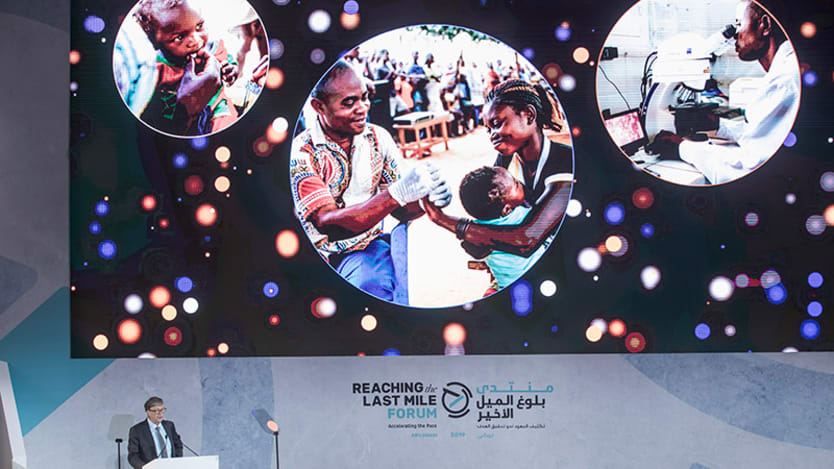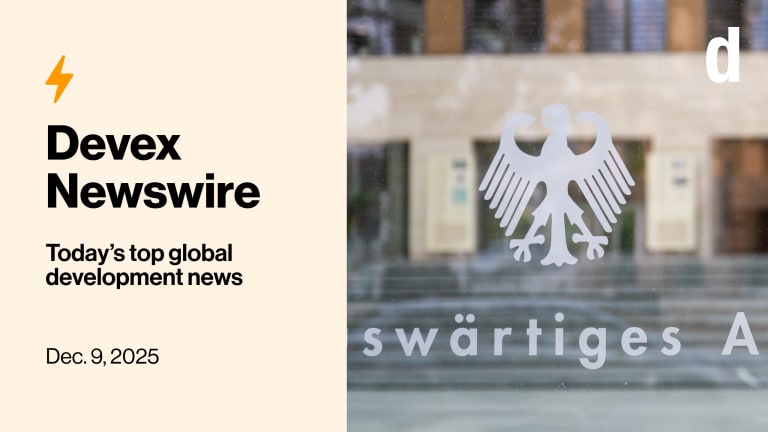
MANILA — Global efforts to accelerate polio eradication received a $2.6 billion push from a range of donors during a conference in Abu Dhabi on Tuesday. The contribution is significant, experts say, but still not enough to fully implement the Global Polio Eradication Initiative’s strategy to eliminate all forms of poliovirus, which requires $3.27 billion through 2023.
Global health officials announced in October that 2 of the 3 wild polio strains have been eliminated, but the disease remains entrenched in Afghanistan and Pakistan. Circulating vaccine-derived polioviruses — which mainly occur in communities with low immunization rates and poor sanitation — have also been on the rise in other countries. These spikes are providing additional challenges to polio eradication efforts worldwide.
“Everything and everyone counts at this point.”
— Oliver Rosenbauer, WHO communications officer and GPEI spokespersonParents’ refusal to vaccinate their children against polio is among the challenges in eradicating all forms of the infectious disease, which can cause paralysis, according to Jay Wenger, who leads the Bill & Melinda Gates Foundation’s work on polio eradication.
“Despite this incredible progress, the polio program faces significant challenges in the last mile towards eradication. Inconsistent campaign quality, massive mobile populations, conflict, insecurity, and, in some instances, parental refusal to vaccines, have prevented health workers from reaching all children everywhere with polio vaccines,” Wenger said in an email to Devex.
“Mobilizing these resources will help ensure that the 450 million children who are immunized each year will continue to receive the vaccine and that efforts continue to reach children everywhere with polio vaccine,” Wenger wrote, referring to the results of the pledging conference.
DevExplains: Vaccine-derived polio and the challenge of eradication
With dozens of cases of circulating vaccine-derived polio in 2019, several countries’ weak health systems and the scourge of vaccine skepticism worldwide are posing challenges to polio eradication efforts.
The Bill & Melinda Gates Foundation offered the biggest pledge of $1.08 billion during the Reaching the Last Mile Forum in Abu Dhabi, followed by the United Kingdom, which pledged £400 million ($514.8 million). Abu Dhabi Crown Prince Sheikh Mohammed bin Zayed Al Nahyan, co-host of the GPEI pledging event alongside the Gates Foundation, pledged $160 million.
Wild polio cases have dropped from 350,000 in 1988 to a reported 33 cases in 2018 — with the latter in just two countries, Afghanistan and Pakistan — according to WHO. Pakistan pledged $160 million during the conference. Nigeria has gone several years without a declared case of polio and is close to being declared polio-free.
The Gates Foundation is now supporting new oral vaccines less able to mutate into forms of polio, and positive data is emerging from the novel oral polio type 2 vaccine trials, which are in phase 2. Full results with more information are expected in early 2020, according to Wenger.
“If successful, the vaccine would provide a comparable level of protection against polio as oral polio virus vaccines, without carrying the same risk of mutating into a rare form of the virus and causing paralysis in under-immunized populations,” Wenger wrote.
This year has not been a particularly good one for polio eradication, with a rise in cases, according to Hamid Jafari, director of the polio eradication program at the WHO regional office for the eastern Mediterranean.
With more cases and infected districts, “obviously the news is very discouraging,” Jafari said.
There have been 102 reported wild poliovirus cases in 2019 so far, a significant jump from 29 cases in the previous year, according to GPEI data. Cases of vaccine-derived polio also increased from 100 in 2018 to 106 in 2019.

“There has been success, but still we are not safe until we have eliminated all cases from Afghanistan and Pakistan. We must do more surveillance,” said Mohamed Shire, a WHO polio eradication officer in Mogadishu, in a phone interview with Devex shortly before the conference.
Shire was 1 of 5 finalists for the biennial Game Changing Innovator Award, recognized for his decades of work on eradicating polio in Somalia. He began in the late 1990s, when Somalia lacked a central government and coordination with various warlords and authorities was necessary, according to Shire. Community engagement was key in cutting the number of polio cases, he said.
WHO experts at the Abu Dhabi conference reflected on how critical the pledged funding is to further work on polio eradication.
Oliver Rosenbauer, WHO communications officer and spokesperson for GPEI, stressed that the pledges came from a wide range of partners. He said all donations are critical, whether big or small.
“Everything and everyone counts at this point,” Rosenbauer said, acknowledging there’s a need to continue engaging existing and new partners to ensure the entire amount needed to end polio.
Jafari told Devex after the pledging event that “everyone’s happy” with the outcome.
“It’s a lot better than $1 billion or $1.6 billion. So we’re looking at the glass more than half full,” Jafari said. “I think the burden is on us. We have to demonstrate progress and that we are turning the corner.”
WHO anticipates that other long-standing partners will come forward with additional pledges to the GPEI strategy, according to Jafari.
“Continued financial and political commitments toward polio eradication are vital until we end the disease,” Wenger wrote.









